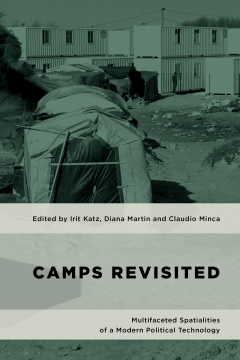
Additional Information
Book Details
Abstract
Facing the current growing global archipelago of encampments, this book project intends to develop a geographical reflection on ‘the camp’, as a modern institution and as a spatial bio-political technology.
This book focuses on past and present camp geographies and on the dispositifs that make them an ever-present spatial formation in the management of unwanted populations characterizing many authoritarian regimes as well as many contemporary democracies. It also offers and investigates possible ways to resist the present-day proliferating manifestations of camps and ‘camp thinking’, by calling for the incorporation of ‘camp studies’ into the broader field of political geography and to consider the geographies of the camp as constitutive of much broader modern geo-political economies.
By linking spatial theory to the geopolitical and biopolitical workings and practices of contemporary camps, the contributions in this collection argue that the camps seem to be here-to-stay, like a permanent/temporary presence giving shape to improvised, semi-structured and hyper-orderly structured spatialities in our cities and our countryside. Camps are also a specific response, for example, to the changing conditions of European borders due to the ‘refugee crisis’ and the rise of nationalism in many countries affected by such crisis.
This is a must-read collection that will stand as a pivotal reference point in the field. Camps Revisited is innovative in its theorisations of the camp as a key political technology and comprehensive in its geopolitical mapping of the globe’s camp archipelagos. This book reveals the camp’s entangled complexities, multidimensional uses and its contested relations of power.
Joseph Pugliese, Professor, Department of Media, Music, Communication and Cultural Studies, Macquarie University
Irit Katz is an architect, Affiliated Lecturer at the Department of Architecture, University of Cambridge, Bye-Fellow and Director of Studies in Architecture at Girton College Cambridge.
Diana Martin is Senior Lecturer in Human Geography at the University of Portsmouth.
Claudio Minca is Professor and Head of the Department of Geography and Planning at Macquarie University.
This book is an urgent intervention into the spatial, political and juridical spaces of camps. It analyses camps as historical and contemporary structures, as a space that is contingent and ubiquitous, urban and makeshift. Above all, it makes us recognize how camps are now a central feature of our political and geographical lives.
Shailja Sharma, Professor of International Studies and Director of Refugee and Forced Migration Studies, DePaul University
For containment, control, protest, or protection, camps have become an ubiquitous presence in contemporary world. This must-read collection offers a theoretically astute and empirically rich exploration of camps, their functions and purposes across continents and time.
Nando Sigona, Reader in International Migration and Forced Displacement, University of Birmingham
Reflecting on the development of camps the world over, Camps Revisited offers an important and extremely timely analysis of how to understand the formation, mutation, potentiality, and limits of the camp as a political and spatial technology. Addressing questions of governance, activism, informality, and insurgency, this collection offers a rich source for developing a critical politics of the camp.
Jonathan Darling, Assistant Professor in the Department of Geography, Durham University
Table of Contents
| Section Title | Page | Action | Price |
|---|---|---|---|
| Contents | v | ||
| Chapter One: The Camp Reconsidered | vi | ||
| Part I: INSTITUTIONAL AND MAKESHIFT CAMPS | 14 | ||
| Chapter Two: Networks of Encampments and “Traveling” Emergencies: The Bologna Hub between Carceral Geographies and Spaces of Transition | 16 | ||
| Chapter Three: Walking the Balkan Route: The Archipelago of Refugee Camps in Serbia | 35 | ||
| Chapter Four: The Bubble, the Airport, and the Jungle: Europe’s Urban Migrant Camps | 60 | ||
| Chapter Five: On the Meaning of Shelter: Living in Calais’s Camps de la Lande | 82 | ||
| Part II: CAMP IDENTITIES | 98 | ||
| Chapter Six: Indefinite Imprisonment, Infinite Punishment: Materializing Australia’s Pacific Black Sites | 101 | ||
| Chapter Seven: Protracted Encampment and Its Consequences: Gender Identities and Historical Memory | 121 | ||
| Chapter Eight: “De-Camping” through Development: The Palestinian Refugee Camps in the Gaza Strip under the Israeli Occupation | 136 | ||
| Chapter Nine: Grassroots Solidarity and Political Protest in Rome’s Migrant Camps | 158 | ||
| Chapter Ten: Communities of Violence in the Nazi Death Camps | 176 | ||
| Part III: THE CAMP AS A POLITICAL TECHNOLOGY | 196 | ||
| Chapter Eleven: Urban Protest Camps in Egypt: The Occupation, (Re)Creation, and Destruction of Alternative Political Worlds | 198 | ||
| Chapter Twelve: The Post-Disaster Camps in Ecuador: Between Emergency Measures and Political Objectives | 215 | ||
| Chapter Thirteen: Touring the Camp: Ghostly Presences and Silent Geographies of Remnants at Galang Camp, Indonesia | 234 | ||
| Chapter Fourteen: Camps, Civil Society Organizations, and the Reproduction of Marginalization: Italian and French “Solidarity/Inclusion” Villages for Romani People | 258 | ||
| Chapter Fifteen: The Bunker and the Camp | 280 | ||
| Index | 294 | ||
| About the Contributors | 307 |
